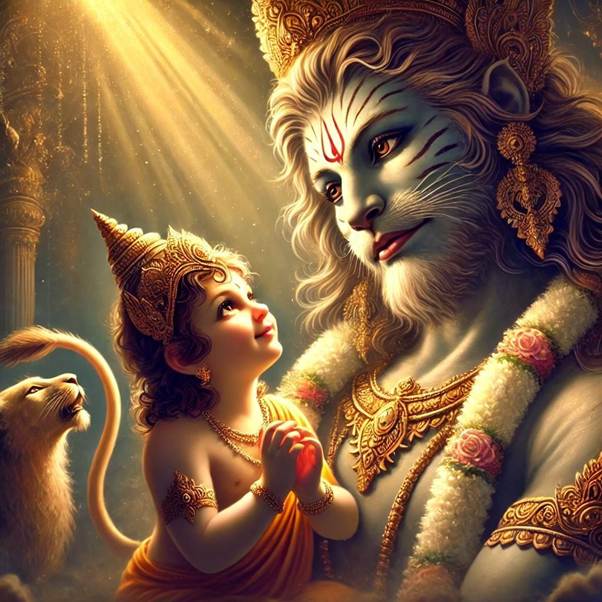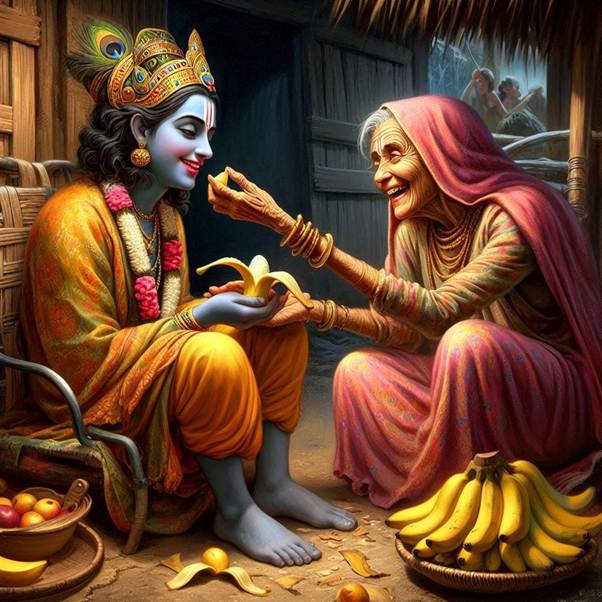Have you ever found yourself in a quiet moment or sitting in a temple, whispering a prayer? “Oh God, please fulfill this one wish of mine, and I promise I won’t ask for anything again.” Maybe you have done this more times than you can count.
When our wishes are granted, we exclaim, "Bhagavan is so kind!" Yet when things don't go our way, we grumble, “Why doesn't He listen to me?” This emotional rollercoaster of gratitude and frustration begs an important question. Are we engaging in genuine devotion, or are we merely seeking a quid pro quo for our prayers?

Beyond the Wish List
To delve deeper into this, let us reflect on a fascinating tale.
There was an Arab shaikh who had thirty wives. Upon visiting Europe, he was overwhelmed by the array of gifts available. In his excitement, he wrote to his wives, asking what they would like him to bring. All of them provided detailed wish lists—except for the youngest wife. She sent a simple note with a numeral 1. Curious, he returned home with all the gifts, but instead of sending her a present, he personally visited his youngest wife. “What did you mean by this numeral 1?” he inquired. She responded, “I wanted you and nothing else.”
The story speaks volumes.
Just as the youngest wife yearned solely for her husband’s presence, God beckons us to cherish our bond with Him above all else. When we do this, our devotion blossoms into a meaningful connection with the Divine, rather than just a means to fulfill our material needs. This timeless wisdom is mirrored throughout sacred texts.
But what is the issue with approaching God with material desires, such as praying for a good job, health, or well-being of loved ones?
When we seek God for material rewards, our devotion becomes tainted with selfishness. As much as we may try to cloak it with the word "Bhakti," it is simply devotion to our desires, not to Bhagavan.
For instance, if you visit a temple day after day, praying for a specific outcome— “Oh God, please let my child get better”—what you are doing in effect is bhakti of your child, care of God. Your mind thus becomes more focused on your child’s well-being than on the presence of God. While caring for loved ones is noble, true bhakti means lifting our hearts towards the Divine, not tethering our worship to worldly outcomes.
In our ignorance, we often assume God is like a "cosmic bellboy." We press the request button, expecting the Lord to respond and fulfill our every wish, even without having formed a connection with Him.
Does this reflect the dynamics of genuine relationships?
Imagine asking someone for something without any basis for that request. Relationships—whether between people or with the Divine—are not founded on constant demands. Moreover, if we do establish a bond with Bhagavan through worship, shouldn’t we be seeking something profound, just as Prahlad did?

A Selfless Prayer
In a moment of divine encounter, young Prahlad stood before the mighty Narsingh Bhagavan, who had manifested in all His glory, drawn forth by Prahlad's unshakable faith. With boundless affection, God lifted Prahlad in His lap and said, "My child, I am extremely pleased with your devotion. Ask for whatever you wish."
Prahlad's response left the Supreme Almighty speechless:
"My Lord, I am Your servant, and the duty of a servant is to serve and not to ask. If I ask, I will become a businessman. However, if it is Your instruction that I must ask, I will obey. Therefore, I ask this: that I may never ask You for anything ever again.” He even prayed to God, “If I have even the slightest trace of selfish desire in me, please remove it, and let me be Your pure devotee.”
At that young age, Prahlad had realized that once we start asking, there is no end to our desires. Each desire begets another, and before long, we forget the whole purpose of devotion.
This insight reveals a deeper truth.
In life, we often adopt a transactional mindset, characterized by give and take. We give to the other with the intention of reciprocation, expecting gain for ourselves. This is particularly evident in business, where one is inevitably concerned about what they stand to receive in return. We often make the same mistake, going to the temple and beseeching God for material boons. We may bow down before the altar, but our thoughts are fixated on getting something rather than on the act of devotion itself.
Devotion, however, is not a transaction. It is an act of love. A relationship with God based on selflessness—nishkam bhakti—means desiring nothing in return. Prahlad's wisdom reminds us that true devotion lies in loving God, simply for the sake of love itself, without the anticipation of reward.

Unwavering Devotion
The mythical Chatak bird's love for the Swati Cloud exemplifies such selfless devotion.
The Chatak drinks water of the Swati Cloud; the cloud that forms in the Swati Nakshatra. It patiently waits for the cloud to appear no matter how thirsty it may be.
Tulsidas ji says,
“जाचे बारह मास, पिये पपीहा स्वाति जल।
जान्यो तुलसीदास, अगम सनेहि मन॥"
“Just as the Chatak bird waits all year to drink only the Swati cloud’s raindrop, true devotion is singular and beyond ordinary comprehension. Tulsidas conveys that such love is rare, patient, and deeply devoted.”
Further, this Chatak remains fixed in its devotion to the Swati cloud’s downpour even when its beloved cloud behaves harshly.
"पाहि पवन दामिनी गरज, छारी चकोरी काहि कीजि।
रोशन प्रियतम दोष लखी, तुलसी राग हि रुझी॥"
“The wind blows, lightning flashes, and the Swati cloud roars, but the Chatak bird does not mind. Similarly, a true lover remains absorbed in love alone, disregarding everything else. Tulsidas emphasizes steadfast devotion that is undistracted by external disturbances.”
The Chatak bird’s devotion is unique. Even as its beloved cloud thunders, strikes lightning, and hails down upon it, the Chatak sings an enchanting melody with a sole intention to please its beloved.
In contrast, when we are faced with adversity or misfortune after praying or visiting a temple, we feel betrayed or question the point of our devotion. The Chatak's unwavering commitment inspires us to reexamine our relationship with God. It is a powerful metaphor for the devotion we should strive for, even in adverse circumstances.
A shining example is Bhishma's devotion to Shree Krishna.
During the battle of the Mahabharat, when Shree Krishna lifted the chariot wheel to strike Bhishma in anger, Bhishma did not get dissuaded. Instead, he smiled and said, “My Lord, if you do not lift your weapon against me, then I am not the son of Shantanu and Ganga.” Bhishma accepted Shree Krishna’s apparent wrath and even felt thrilled in it.
Further, when Bhishma was felled on the battlefield for six months, he meditated on that same angry form of his Ishtadev. Such is the true spirit of devotion: choosing to relish God's presence and action, regardless of the form it takes. Just as jalebis are perfectly rounded and filled with sweet ras, every behavior of God is (rasmay) infused with divine love for the uncomplaining, selfless devotee.
It is easy to chant the name of God when life unfolds smoothly, but what happens when storms rage? In those tumultuous moments, do we continue our worship, or do we waiver in our faith?
As the saying goes, “when the going gets tough, the tough get going.” The path of spirituality is not for the faint-hearted; it requires courage. Saint Kabir said, “true bravery is not found on the battlefield but in those who reject material temptations for the allure of divine love with steadfast determination.”

Love that Moves God
And it is here, at the intersection of courage and selfless devotion, that we discover the soul's secret language that speaks directly to God's heart.
Shree Krishna says in the Bhagavad Gita:
उदारा: सर्व एवैते ज्ञानी त्वात्मैव मे मतम् |
आस्थित: स हि युक्तात्मा मामेवानुत्तमां गतिम् || 18||
BG 7.18: All those who are devoted to Me are indeed noble. But those in knowledge, who are of steadfast mind, whose intellect is merged in Me, and who have made Me alone as their supreme goal, I consider as My very self.
In this powerful verse, Shree Krishna extols the nobility of all His devotees. Yet, He places a special emphasis on those who worship Him not for material gain, but out of sheer, unconditional love. They bind even the Supreme Almighty.
Interestingly, the Vedas describe Bhagavan as complete in Himself. This means He is beyond human emotions and needs—impervious to hunger, thirst, aging, or sickness. But here lies a divine paradox: God becomes hungry for the pure, selfless love that flows from the heart.
This theme is encapsulated in a heart-warming episode from the Mahabharat.
Before the battle of Kurukshetra, Shree Krishna went to Hastinapur to forge a treaty of peace on behalf of the Pandavas. Upon His arrival, Duryodhan, eager to gain Krishna’s favor for the upcoming war, hosted a lavish feast. An extravagant spread of 56 exquisite dishes was served in golden and silver vessels. “Let us have a meal”, Duryodhan boasted.
To which Shree Krishna responded thoughtfully: “A person eats for one of two reasons—to satiate their hunger or to share the joy of love. In this case, neither is present.” Despite the opulence, the grandeur of offerings felt empty, as it held no love. In contrast, a humble invitation from Vidur's home beckoned Him, where pure love awaited His divine presence. His heart was drawn to the sincerity and warmth of Vidur's modest dwelling.
When Vidur learned that Shree Krishna would be visiting his house, he hurried to the market to fetch food for Him. Meanwhile, Krishna arrived and began knocking on their door.
"Who is there?" Vidurani, Vidur's wife, asked.
"It is me!" Krishna replied. "I am very hungry. Please open the door!"
Vidurani was overwhelmed with happiness. “My Lord has come!” she exclaimed.
“Aren't you going to let me in?” Shree Krishna asked, smiling. He knew that Vidurani had deeply longed for the opportunity to serve her beloved Lord.
Overwhelmed with His divine presence, she completely forgot herself and rushed out without realizing she wasn’t even properly dressed. Krishna, understanding the depth of her love, gently placed His pītāmbar (yellow cloth) around her shoulders as He entered the house. Eager to feed Shree Krishna with her own hands, she brought a bunch of bananas from the kitchen. However, in her state of devotional reverie, she began dropping the fruit and accidentally put the banana peels in Krishna’s mouth.
Shree Krishna exclaimed, “I have never tasted anything like this!” Blissfully, He ate the peels, as if they were the most delicious food in the world.
Even though her offering was bizarre, Shree Krishna savored the bhāv (feeling) in her heart. This moment is a timeless reminder that it is not the material offering that matters, but the underlying love and devotion that counts. God accepts anything offered with love, from lavish delicacies to even fruit peels!
Love, in its purest form, is what truly moves God.
Conclusion
Ultimately, the true language of devotion is one of love—pure, untainted by selfish desires. It is about offering love to the Divine, without asking for anything in return. It is about becoming like the Chatak, waiting for the divine rain, uncomplaining and steadfast, even when faced with challenges.
So, the next time you feel insecure about your prayers not being answered, take a step back and reflect: Are you seeking God for His own sake, or simply to fulfill your desires?
Resources
● The Power of NOT Asking from God - The Ultimate Relationship with Shree Krishna | Swami Mukundananda
● When Shree Krishna Tests You - Do you Have the Determination NOT to Give Up? | Swami Mukundananda
● The Power of Your Love for God | Swami Mukundananda
Call to Action
Deepen your connection with the Divine!
Read Nourish Your Soul by Swami Mukundananda. Through inspiring stories of legendary saints, this book helps you cultivate unconditional love, strengthen your spiritual practice, and face life’s challenges with faith and resilience.

